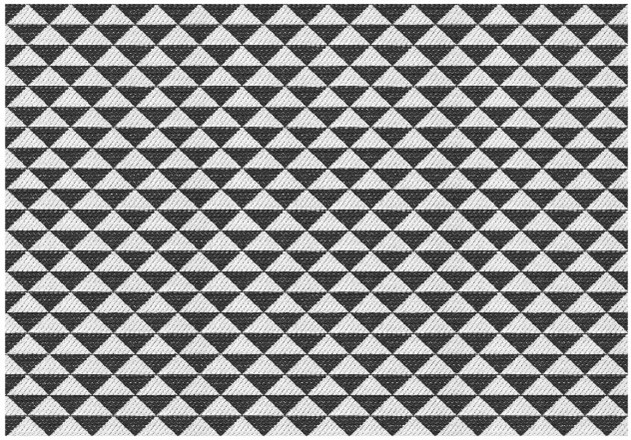IP Telegram: Prada’s triangle pattern devoid of any distinctive character
Prada’s Triangle Pattern Faces Registration Hurdles
Our latest IP Telegram unpacks the recent decision by the EUIPO Board of Appeals on Prada’s attempt to register its iconic triangle pattern as a trademark.
In a landmark ruling on 19 December 2023, the Board deemed Prada’s pattern devoid of distinctive character under Article 7(1)(b) of the EUTMR.
The decision underscores that the pattern, while aesthetically appealing, lacks inherent distinctiveness and is considered a basic and commonplace figurative pattern. Despite Prada’s claim that the triangle had become their iconic signature, the Board held firm, stating it does not contain any notable variation and is perceived by the average consumer as a mere decorative element rather than an indicator of commercial origin.
The verdict highlights the importance of distinctiveness in trademark registration, emphasizing that even well-known patterns may face challenges if deemed too generic.
Explore the full IP Telegram for an in-depth analysis of this case and stay informed on the evolving landscape of trademark registration.
On 19 December 2023, the EUIPO Board of Appeals issued a decision adjudicating on the admissibility of registering Prada’s Triangle pattern as a trademark.
In 2022, Prada applied to register the following pattern mark as a trademark.
However, their application was rejected as to the goods covered by the majority of the classes applied for.
According to the EUIPO, under Article 7(1)(b) of the EUTMR, this mark is not distinctive because it consists of a set of black and white triangle elements which are repeated regularly, and the pattern is nothing more than the outward appearance of the goods.
Prada challenged the decision claiming that the upside-down isosceles triangle had clearly become PRADA’s iconic signature.
Prada also stated that it had extensively used and promoted the contested sign.
The Board of Appeal dismissed the action.
According to the Board of Appeal, „the triangle-shaped pattern at issue is a basic and commonplace figurative pattern” which „does not contain any notable variation in relation to the conventional representation of triangle-shaped pattern and is the same as the traditional form of such a pattern.”
It would follow that the average consumer, when seeing the Prada pattern, probably would consider it only as an attractive detail of the product in question, or as a banal decorative element, rather than as an indication of its commercial origin.
Finally, the Board of Appeal concluded that Prada’s pattern is not inherently distinctive. However, it can acquire distinctiveness through use in accordance with Article 7(3) of the EUTMR.
Case summary by EUIPO:
„Taking exclusively into account the inherent distinctiveness of the sign, in the absence of verbal elements or other elements that could allow the sign at issue to be perceived by consumers prima facie as an indicator of commercial origin, the Board considers that the overall impression created by the simple disposition of juxtaposed triangles following a pattern, as in the mark applied for, is devoid of any distinctive character for all the goods and services in question. The relevant consumers will not conceive the mark as a badge of trade origin, but merely as a decorative pattern of a style which is commonplace in the field of textiles and other industries concerned in the case at issue. In fact, the pattern at issue may to a greater or lesser extent cover their surface and thus correspond to the outward appearance of the goods, or will be perceived as a banal design element in relation to the services.”
Full text of the EUIPO Decision is available here:
https://euipo.europa.eu/eSearchCLW/#key/trademark/APL_20231219_R0827_2023-2_018683223
See more:
SUMMER IP MEETINGS FOR LAW STUDENTS IN OUR GARDEN
Discover the Fascinating World of Intellectual Property Rights with Żuraw i Wspólnicy sp. k.! Are you a law student interested in intellectual property law? Do you want to learn about trademarks and their protection principles? Are you eager to explore...
CJEU Ruling Reinforces: Mere Knowledge of Existing Trade Marks Isn’t Enough to Prove Bad Faith Applications
In its judgment of 15 May 2024, in Case T-181/23, the CJEU dismissed the appeal against the decision of the EUIPO Board of Appeal and thus, the Court once again confirmed that the applicant’s mere knowledge of a third party's earlier trade mark shall not be sufficient...
A Czech court rules on copyright to a work generated by AI
Artificial intelligence is becoming more and more prominent in the sector of music, literature and, as a matter of fact, in most fields that require a creative approach to any task or issue so far reserved exclusively for humans. It was therefore only a matter of time...

